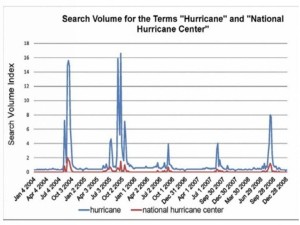A recent study by researchers at Mississippi State University and the University of Alabama sought to identify the behavior of the general public in advance of landfalling hurricanes by examining Google search data. Using publically accessible data from Google Trends, Google Insights, and Google Hot Trends, patterns in keyword searches shed light on how the public perceives their individual risk level from impending hurricanes.
From 2004 to 2008, Google searches in the Eastern U.S. with the word hurricane and searches with the words National Hurricane Center were examined in terms of both volume and region. As expected, the spikes in search volume appeared in yearly cycles, peaking during the North Atlantic Hurricane Season in late summer and early fall (see figure below). Years that had especially high-impact hurricanes (e.g. Frances in 2004, Katrina in 2005, Ike in 2008) saw the greatest spikes in search volume.

Google search volume by week for “hurricane” and “National Hurricane Center” from 2004 to 2008. Image reproduced from Sherman-Morris et al.
Regional analysis of Google searches also showed a strong correlation with each hurricane forecast cone (projected path) from the National Hurricane Center, even up to five days in advance of a forecasted landfall. This demonstrates the incredible influence of these forecast products on the public. While this influence usually has a positive effect by preparing the potentially-affected population for evacuation or storm-readiness, it can also have a negative impact if the hurricane fails to materialize where initially forecasted. The result is a “false alarm” and reduced confidence of the public in future forecasts. This study reaffirms that avoiding a “Boy Who Cried Wolf” scenario is more important than ever in today’s Information Age.
Researchers also found heavy search traffic for words like traffic, evacuation, and gas prices in conjunction with searches for hurricane, suggesting the relevance and need for very specific emergency management information on very small regional scales in advance of impending hurricanes. Local weather stations and National Weather Service offices can use these up-to-the-minute Google search data to identify areas that they might not have covered yet that the public still wants to know about. It is obvious that the availability of this data from Google stretches far beyond just being a gimmick and can be used in real-time to save lives during landfalling hurricane events.
References:
Sherman-Morris, K., J. Senkbeil, and R. Carver. “Who’s Googling What?” Bulletin of the American Meteorological Society. Aug. 2011: 975-985. Print.

Comments are closed.